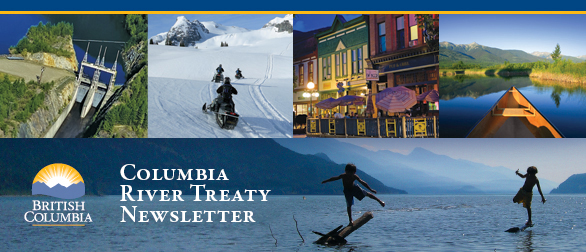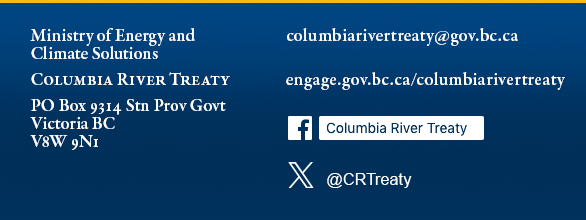Columbia River Treaty
Edition: April 2021

As Canadian Columbia River Treaty negotiators await U.S. response, B.C. moves forward on key issues
Apr 27, 2021
Although the next round of Columbia River Treaty negotiations has not yet been scheduled, Canada, B.C., Columbia Basin Indigenous Nations and local governments are busy advancing work to strengthen Canadian positions and make improvements in the Basin.
The Canadian negotiating team is awaiting word from their American counterparts regarding when the next round of negotiations will take place, as well as a response to the proposal Canada tabled at the 10th round of negotiations in June 2020. That proposal, outlining a framework for a modernized Treaty, was developed collaboratively by Canada, B.C. and Basin Indigenous Nations. Given the change in U.S. administration and other U.S. priorities such as COVID-19 response, the delay is not unexpected; however, negotiators are hopeful that the talks will resume soon.
In the meantime, work is moving forward in B.C. on key Treaty-related priorities:
A technical working group reporting to the Negotiation Advisory Team (made up of representatives from Canada, B.C. and the Ktunaxa, Secwepemc and Syilx/Okanagan Nations), is undertaking a project to examine scenarios for how the Canadian Treaty dams could be operated differently to meet Basin interests. This work will consider factors such as ecosystems, Indigenous cultural values, flood-risk management, hydro power, and other social and economic objectives. The results will inform the Canadian negotiating team’s discussions on how to address ecosystems in a modernized Treaty, and what level of flexibility is needed in B.C. to meet Basin interests. An article in this newsletter elaborates on the process of integrating social and economic objectives into this work.
Another initiative is underway to examine potential Canadian domestic governance models for the Treaty, exploring both the role of Indigenous Nations in the context of the United Nations Declaration on the Right of Indigenous Peoples, and how Basin communities could have a voice in future decisions regarding Treaty operations planning. This work will include consultation with Indigenous Nations, local governments, and Basin stakeholders.
B.C.’s Treaty Team continues to advance several projects to address community interests that have been raised by Basin residents throughout the Province’s public engagement on the Treaty. Some of the highlights include: the Columbia River Treaty Heritage Project, a proposed touring route with stops at key locations throughout the Basin, which aims to acknowledge what was lost when the Treaty dams were created; work between the Village of Valemount, the Province’s Treaty Team, and the Ministry of Environment and Climate Change Strategy to look at regional air-quality issues; and collaboration with diking authorities in Creston Valley to address dike maintenance and construction. The B.C. Treaty Team is also exploring ways to enhance support for the Basin agriculture sector. See the agriculture article in this newsletter to learn more.
Further details about these projects and others will be shared on the Province’s Treaty website when they become available.
As for Canada-U.S. negotiations, the Province will announce the next round once a date is confirmed. Follow the Columbia River Treaty on Facebook and Twitter to stay up to date.


